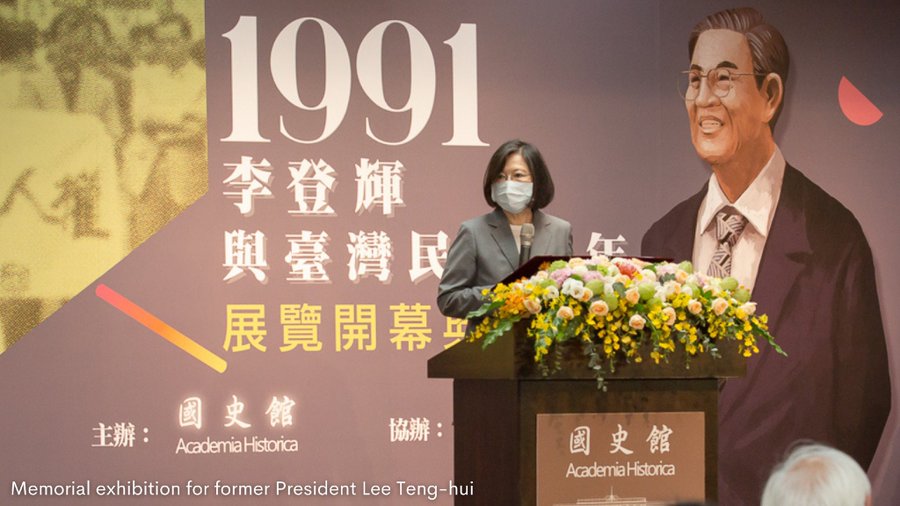Under unrelenting pressure from China, Taiwanese President Tsai Ing-wen has appealed to Japan and to the developed world to step-up their efforts to ensure peace and stability around the Taiwan Strait. In an interview with Japanese magazine Bungei Shunju, Tsai expressed her concerns about the Chinese military build-up in the region.
The Taiwan President has echoed what Japan has been saying over the past couple of months—that China is fast becoming a threat to regional stability. A Japanese Defence Ministry's white paper had recently said that China's rise as a technology and military power is making it a threat to regional peace.
NHK World reports that Tsai called upon Japan, the United States and other nations to restrain China. In her online interview to Bungei Shunju, she referred to the joint statement issued after a Japan-US summit in April and also the G7 communique—both of which urged China to maintain peace in the strait and resolve differences in an amicable manner.
Check out @MOFA_Taiwan Minister Joseph Wu’s message welcoming the enlargement of the Formosa Club with the inclusion of the cross-party Canada-Taiwan Parliamentary Friendship Group! pic.twitter.com/82bRmi7hIB
— The Formosa Club (@_TheFormosaClub) August 5, 2021
Making a case for recognising Taiwan as a separate entity, she added that as more and more countries increase collaboration with Taiwan, it will also make Beijing exercise restraint in its policy-making, including military activities towards the island nation. She also thanked Japan for donating coronavirus vaccines to Taiwan during its time of need.
There is reason as to why the Taiwanese are reaching out to Japan. Both face a common threat from China. The Chinese claim the Japan controlled Senkaku islands, of significant strategic importance, in the East China Sea. In case the Chinese occupy these islands, they can be turned into a base for a Chinse push to the Miyako strait, a chokepoint through which the PLA Navy (PLAN) can make a push into the broader West Pacific Ocean breaking out of an encirclement imposed by the US and its allies.
Miyako strait is a 250 km wide passageway between the Miyako island and Japan’s Okinawa islands. “China’s real intention is not just to dominate but control the Miyako strait,” observes Susumu Takai, Special Research Fellow at the Sasakawa Peace Foundation in Tokyo, as quoted by The Hindu.
The Chinese eye Taiwan as it can also help break out of the naval siege imposed on China, through three island chains controlled by the US and its allies during the heyday of the Cold War. Taiwan if occupied will allow China to based its nuclear submarines which can then prowl undetected in the vast water of the Pacific.
Recognising Taiwan and establishing diplomatic relations is already putting Beijing on a collision course with the rest of the world. As Beijing becomes more hostile in its diplomatic relations with other countries, the latter are also beginning to retaliate by establishing trade, diplomatic and cultural relations with Taiwan.
In the latest development, China recalled its ambassador to Lithuania while simultaneously expelling its Beijing envoy over the tiny European country’s decision to allow an office in Lithuania under its own name. China feels that any attempt to recognise Taiwan is an affront to its One China Policy.
Taiwan, which is barely 180 kms across the Taiwan Straits from China's south-east coast, has been at the receiving end of China's aggression. Chinese military has been browbeating the tiny nation of barely 25 million by sending its naval and coast guard vessels into its waters. Beijing also violates the country's air space by sending across fighter jets with regular frequency. It has also been trying to harm the island nation by destroying its marine ecology.
In the centenary celebrations of the Communist Party of China (CPC), President Xi Jinping had categorically said that it is the dream of every Chinese to see Taiwan integrated—clearly hinting at aggresive action. On many earlier occasions China has threatened to attack Taiwan despite the fact that the two follow different systems of governance and have remained separate for nearly 70 years.
China's hostile intent has made neighbouring countries uncomfortable. Tokyo is perturbed as it feels that an attack on Taiwan will invariably tempt China to take over Japanese islands which lie close to Taiwan. Japan and China have a dispute over the Senkaku Islands which lie close to Taipei—Taiwanese capital.
Tokyo has taken the cudgels on behalf of Taiwan. It has raised the issue of Taiwan's independence with the US and even suggested that any military assault by Beijing should be met headlong by Tokyo and Washington.
For the first time, Japan has shown Taiwan as a separate entity from China in its maps, sending a wave of excitement in the island nation.




















